Don't wanna be here? Send us removal request.
Text
CAITVI SESBIAN LEX SCENE FULL AHH😔
caitvi leaked scenes 😉😉
UNCENSORED
5K notes
·
View notes
Text
this is the most emotionally painful edit I have ever seen and it’s so delectable
Source video:

445 notes
·
View notes
Text
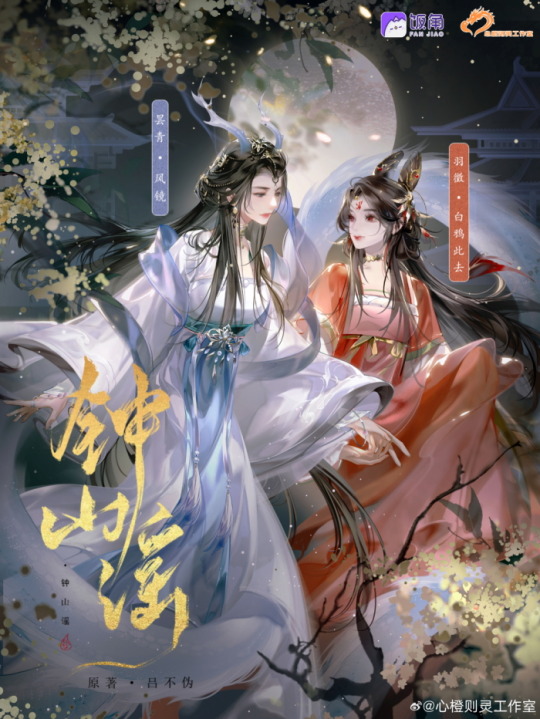

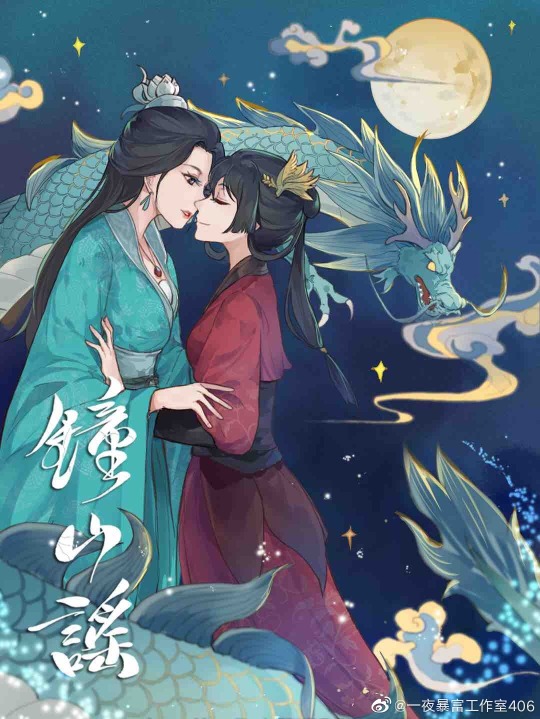

Official art for the audio drama and audiobook adaptations of 钟山谣 (The Ballad of Zhongshan) by 吕不伪 (Lü Bu Wei). This xianxia/xuanhan baihe novel features a romance between a bird (specifically a red-tailed shrike) demon and an ancient dragon goddess.
Read the novel here. Listen the the audiobook here. Listen to the audio drama here.
2K notes
·
View notes
Video
how to draw food in watercolor and chinese painting skill by 王小媛
18K notes
·
View notes
Text
A street performance in Guangdong
Song: 涼涼 by 張碧晨 and 楊宗緯
843 notes
·
View notes
Text
youtube
45 MINUTES OF DYKE TELEVISION: Dyke TV was founded and created by Ana Maria Simo, playwright and cofounder of Lesbian Avengers; Linda Chapman, theater director and producer; and Mary Patierno, independent film and video maker. Dyke TV was created with the intention to provide empowerment for lesbians and increase visibility of lesbian issues, culture and community.
Their mission, and their motto was to "Incite, Subvert, Provoke and Organize." Each episode began with news coverage of lesbian-related issues. Then, the episode covered diverse aspects of different lesbian communities, including art, health, politics, music, sports, etc. Those featured in the episodes came from diverse racial and socioeconomic backgrounds, highlighting intersectional issues within the lesbian community.
79 notes
·
View notes
Text
Yuri Anime Masterlist (as of Oct 2022)

(For those not familiar with the term "yuri" (百合), it is used to refer to anime, manga, light novels etc. which focus on the close relationships - often romantic - between female characters. However, as it is considered a genre in itself, the term is both looser and more restrictive than one might expect, e.g. a work concerned with platonic and not particularly intense relationships between female characters may still be considered "yuri" if it fits the genre tropes and/or if it is marketed as such.)
One day I thought it'd be good to have a masterlist of yuri anime which included commentary on the show, to give people a better idea of what might appeal to them (or what to be wary of). "It'll be easy," I thought. "There aren't that many specifically yuri anime out there," I thought.
Turns out, 22 series may not be a lot if you're looking at all the anime out there, but it certainly doesn't feel that way if you have to write a proper entry for each one. Here it is, a list of all the anime which are specifically marketed as being yuri (i.e. labelled as such on Anime News Network), with commentary, in no particular order.
Edit: Added links to the corresponding Anime News Network and MyAnimeList pages!
At-a-glance list:
Revolutionary Girl Utena (39 episodes + 1 movie, 1997)
Bloom into You (13 episodes, 2018)
Maria-sama ga Miteru (39 episodes, 2004)
Kase-san (58-minute OVA, 2018)
Aoi Hana (11 episodes, 2009)
Otherside Picnic (12 episodes, 2021)
Simoun (26 episodes, 2006)
Yuri Kuma Arashi (12 episodes, 2015)
Akuma no Riddle (12 episodes, 2014)
Citrus (12 episodes, 2018)
NTR: Netsuzou Trap (12 10-minute episodes, 2017)
Adachi to Shimamura (12 episodes, 2020)
Inugami-san to Nekoyama-san (12 5-minute episodes, 2014)
Sasameki Koto (13 episodes, 2009)
Kashimashi Girl Meets Girl (12 episodes, 2006)
The Executioner and Her Way of Life (12 episodes, 2022)
If My Favorite Pop Idol Made It to the Budokan, I Would Die (12 episodes, 2020)
Kannazuki no Miko (12 episodes, 2004)
Strawberry Panic (26 episodes, 2006)
Fragtime (60-minute OVA, 2019)
Sakura Trick (12 episodes, 2014)
Bonus: Yuri is My Job! (upcoming anime)
Details under the cut!
1. Revolutionary Girl Utena (39 episodes + 1 movie, 1997) - Anime News Network | MyAnimeList
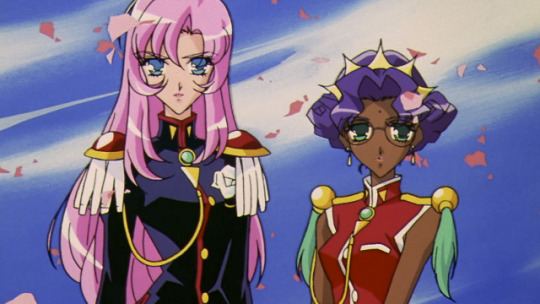
Okay, so this series was not actually marketed as being yuri, but it’s far too ubiquitous for me not to put it in this section. When she was a child, Tenjou Utena (Kawakami Tomoko) was saved by a passerby prince, so she decided that she too wanted to become a prince as an adult. Fast forward to high school, and she hasn’t forgotten that conviction: Utena gets sucked into a series of duels while trying to protect her best friend’s honour. After winning the first duel, she becomes ‘engaged’ to the eccentric “Rose Bride” Himemiya Anthy (Fuchizaki Yuriko), and the two start living together in the same dormitory.
First things first: there are a million content warnings for this series, including implied rape, sexual assault, incest, and homophobia. Although the issues are handled well (in my opinion), it does go to very dark places, so those wanting a light, fun anime to unwind to should look elsewhere. Second, this series is very much a psychological drama utilising the episodic duels as a way of hone in on Utena’s opponents and their stories, so Utena and Anthy’s relationship – though important – is definitely not the focus of the anime. Third, the TV series is limited to hinting at the romantic relationship between Utena and Anthy, not to mention that they spend most of the series being little more than acquaintances rather than actual friends. The movie Adolescence (which can be taken as a retelling or sequel, depending on your perspective) is much more explicit on this front, but also suffers from a significantly shorter runtime and a much more opaque approach to storytelling.
That being said! If you’re okay with all of the above, this series is pretty much a must-watch. The simplistic premise belies a much more complex and nuanced story about gender roles, sexuality, and human relationships and remains one of the smartest anime ever made, over twenty years on.
2. Bloom into You (13 episodes, 2018) - Anime News Network | MyAnimeList

Probably one of the slickest-looking yuri anime out there, Bloom into You is a beautiful, polished adaptation of a manga of the same name by Nakatani Nio. Main character Koito Yuu (Kanemoto Hisako), who hasn’t experienced romantic love before, thinks student council senior Nanami Touko (Kotobuki Minako) is the same way until Touko suddenly confesses to her. The story follows the two girls’ trials and tribulations after that confession, and in particular how Yuu grows into her romantic feelings for Touko. The story can be messy at times but it’s got plenty of heart, and I really really love the other explicitly queer side characters – they’re so good that this series is worth watching even if you don’t click with the main couple IMO.
3. Maria-sama ga Miteru (39 episodes, 2004) - Anime News Network | MyAnimeList

A list of yuri works would be incomplete without mentioning this genre-defining juggernaut of a series created by light novel author Konno Oyuki, which is responsible for reviving the Class S genre and ensuring that yuri was for a long time – and to a large extent still is – associated with genteel all-female schools and girls calling their older targets of affection “onee-sama”. It starts with the elegant and aloof Ogasawara Sachiko (Itou Miki) inviting the main character Fukuzawa Yumi (Ueda Kana), an ordinary junior from the year below, to become her “petite sœur” (“little sister”, essentially a mentee), but branches out into more of a slice-of-life ensemble piece looking at Yumi and her friends and the various “sœur” pairs of the prestigious Lilian Girls’ Academy. Due to the “sœur” system, there is a whole fleet of F/F ships to pick from, but do note that only one character out of the very large cast is overtly queer.
Personally, I found the anime a bit dull, but the light novels and drama CDs were much more to my taste. Either way, anyone with an interest in the history of yuri as a genre should definitely check this series out in one way or another.
4. Kase-san and Morning Glories (58-minute OVA, 2018) - Anime News Network | MyAnimeList

The popular manga by Takashima Hiromi has sadly never received the full anime treatment, but at the very least there’s an OVA which adapts part of the story. The OVA starts with two high school sweethearts having recently entered into a relationship together, but Yamada Yui (Takahashi Minami), the timid one of the pair, is plagued with doubts over her relationship with the sporty Kase Tomoka (the eponymous “Kase-san”; Sakura Ayane). Famous for being teeth-rottingly sweet.
5. Aoi Hana (11 episodes, 2009) - Anime News Network | MyAnimeList
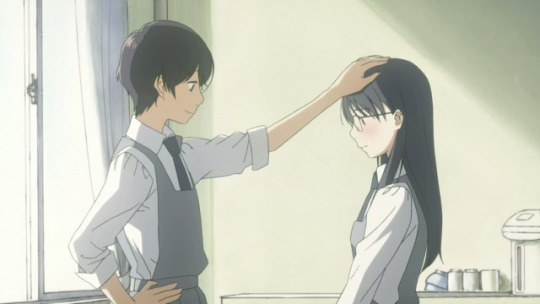
Despite the somewhat misleading OP, Aoi Hana is a character-focused slice of life show about lesbian high schooler Manjoume Fumi (Takabe Ai), her crush on the prince-like Sugimoto Yasuko (Ishimatsu Chiemi), and her coming out to her childhood best friend and first love Okudaira Akira (Gibu Yuko). You might be wary as this anime is an adaptation of a series by queen of messy LGBTQ-related manga Shimura Takako, but the story ends before it gets into the real melodrama, leaving viewers with an open but hopeful conclusion. The gentle pastels of the anime also look very nice IMO, it’s a great fit for Shimura’s art.
6. Otherside Picnic (12 episodes, 2021) - Anime News Network | MyAnimeList

Adapted from the ongoing light novel series by Miyazawa Iori, Otherside Picnic opens with college student (in a yuri anime! I know!) Kamikoshi Sorawo (Hanamori Yumiri) poking around in the supernatural “Otherside” and nearly being killed by a monster for her efforts. Her rescuer is the gun-toting Nishina Toriko (Kayano Ai), a young woman who happens to attend the same university. Since Sorawo is deeply interested in urban myths and Internet creepypasta, she decides to team up with Toriko, who is trying to search her friend who went missing in the Otherside. Otherside Picnic draws on existing Japanese urban myths and the Russian SF novel Roadside Picnic by Arkady and Boris Strugatsky, but is also, though nobody seems to mention it, very much influenced by certain parts of the massive Touhou franchise – specifically the exploits of Renko and Merry (Sorawo in particular is strongly reminiscent of Renko). Although the anime doesn’t adapt enough to get to the explicitly romantic aspects of their relationship and has been criticized for undermining the horror elements with cheap CG, it has been praised for its college-age leads (though you wouldn’t know that from the character designs) and genre fiction focus, which are unusual in yuri.
7. Simoun (26 episodes, 2006) - Anime News Network | MyAnimeList
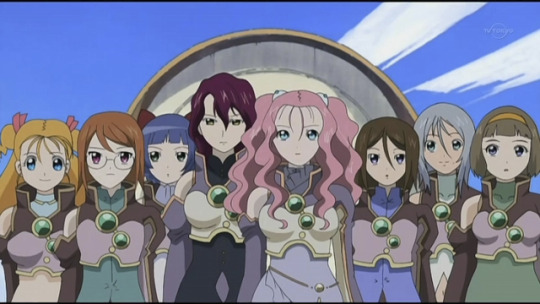
In the original SF anime Simoun, viewers are introduced to the nation of Simulacrum, which is embroiled in a bitter war against two other nations. On the front lines of this conflict are the main characters, a group of under-seventeens who pair up to pilot Simulacrum’s mecha (the titular “Simoun”). It’s a bit of an interesting case because although it is known and marketed as a yuri anime, for the duration of the series, the majority of the cast are not known to be female – the pilots come from a species where they are born monogender (although the designs skew feminine, similar to the Asari in Mass Effect) and pick their preferred gender at the age of seventeen (honestly, this sounds like a very sensible system). Don’t worry though, since sources say that a bunch of the endgame pairs do end up being F/F. Actually I’ve never watched this anime before as it’s known to be fanservice-heavy, but it does sound rather intriguing on paper.
8. Yuri Kuma Arashi (12 episodes, 2015) - Anime News Network | MyAnimeList

Directed by Ikuhara Kunihiko of Sailor Moon and Utena fame and with character designs by prolific out yuri mangaka Morishima Akiko, Yuri Kuma Arashi is a surreal tale set in a world where bears can take on human form and are feared and reviled by the human population, who have constructed the “Wall of Severance” to keep them out. Amidst this, main character Tsubaki Kureha (Yamane Nozomi) is a bear-hating human who finds out that two of her classmates – Yurishiro Ginko (Arakawa Miho) and Yurigasaki Lulu (Ikuta Yoshiko) – are actually bears in disguise. The anime is generally well-received, with critics praising its handling of homophobia, prejudice, and exclusion, but I personally felt that the series suffered from its length (it was by far the shortest of Ikuhara’s outings at the time) and heavy use of imagery and symbolism in place of character-building and narrative construction, so YMMV. Please also be warned of that there’s some rather gratuitous fanservice, especially in the first few episodes. The three-volume manga of the same name by Morishima Akiko was good though – it uses the same premise but takes it in a very different direction!
9. Akuma no Riddle (12 episodes, 2014) - Anime News Network | MyAnimeList

A rare case of a yuri anime which manages to cover the entirety of the series it was based on, Akuma no Riddle is an adaptation of the manga written by Kouga Yun and drawn by Minakata Sunao. Assassin-in-training Azuma Tokaku (Suwa Ayaka) is exceedingly skilled but suffers from a career-ruining mental block: she can’t ever bring herself to land the killing blow, no matter how much she wants to. Tokaku is given the chance to prove herself by entering a girls’ school battle royale where she is to compete with other young assassins to kill a certain target – the bafflingly ordinary-seeming Ichinose Haru (Kanemoto Hisako). On an impulse, the otherwise cold Tokaku swears to protect Haru from the others, and becomes her bodyguard. As with Maria-sama ga Miteru, the series comes with a lot of pre-packaged F/F pairs for your shipping pleasure, but only one pair is overtly romantic. (Also, I was very unlucky and latched onto a pair which happens to feature the only character who has a male love interest… RIP.) The story needed a bit more space to breathe IMO, but others have enjoyed it for the action, fun premise, and for being one of the few yuri anime that isn’t yet another high school coming-of-age romance.
10. Citrus (12 episodes, 2018) - Anime News Network | MyAnimeList

An adaptation of the hit manga by Saburouta, Citrus focuses on the tumultuous relationship between rule-breaking gyaru Aihara Yuzu (Taketatsu Ayana) and uptight student council president Aihara Mei (Tsuda Minami) – who, it turns out, is Yuzu’s new stepsister. It is controversial for its frequent depictions of non-consensual kissing and other physical contact, and for the generally melodramatic, titillating approach taken to the relationship between the two leads, but some queer women really love this series and I’m not here to police, so here it is.
11. NTR: Netsuzou Trap (12 10-minute episodes, 2017) - Anime News Network | MyAnimeList

One of the most infamous yuri series out there, this is an adaptation of the manga by Kodama Naoko. It’s essentially a daytime soap opera dressed up as a high school drama: Okazaki Yuma (Kakuma Ai) and Mizushina Hotaru (Igarashi Hitomi) are childhood friends who both have boyfriends but end up messing around with each other. There’s cheating, abusive boyfriends, toxic relationships, and melodrama galore – very rare for yuri anime. If you enjoy soap operas this might be just the thing, although there’s probably more fanservice than normal.
12. Adachi to Shimamura (12 episodes, 2020) - Anime News Network | MyAnimeList

Quiet slice-of-life series “Adachi and Shimamura” is an adaptation of an ongoing light novel series by Iruma Hitoma. The story depicts the everyday life of high school student Adachi Sakura (Kitou Akari) and her friend Shimamura Hougetsu (Itou Miku), who she has feelings for. Adachi’s feelings towards Shimamura are overtly romantic, but be warned that their relationship is more open-ended than in the light novels due to only the first few volumes being adapted. Received praise for its atmosphere-building, but this is tempered by there being a lot of fanservice throughout.
13. Inugami-san to Nekoyama-san (12 5-minute episodes, 2014) - Anime News Network | MyAnimeList

A series of vignettes adapted from the yonkoma (4-panel) manga by Kuzushiro, Inugami-san and Nekoyama-san is about the relationship between the dog-like cat-lover Inugami Yachiyo (Uesaka Sumire) and cat-like dog-lover Nekoyama Suzu (Toyama Nao). I haven’t seen it myself, but judging by the reception, it’s a good pick for those looking for a quick, fluffy watch.
14. Sasameki Koto (13 episodes, 2009) - Anime News Network | MyAnimeList

This adaptation of Ikeda Takashi’s manga follows high school student Murasame Sumika (Takagaki Ayahi), who has a crush on her female best friend Kazama Ushio (Takamoto Megumi). The twist is that she knows Ushio is into girls… so what’s the problem? Well, unfortunately for Sumika, Ushio can’t stop going on about how she likes very cute, “feminine” girls, and Sumika just doesn’t fit that type. And on a meta level, time is Sumika’s worst enemy, because this is another case of the main couple not getting together by the end of the anime due to the limited runtime. The series’ scope extends beyond the romantic storyline, however, and touches upon homophobia and queer media (okay, yuri doujin). On the downside, a lot of the humour is dated, and a cross-dressing character is dealt with in a poor manner.
15. Kashimashi Girl Meets Girl (12 episodes, 2006) - Anime News Network | MyAnimeList

Part of the 2006 yuri anime boom, Kashimashi is based on the manga by Akahori Satoru. The story starts with young boy Osaragi Hazumu (Ueda Kana) having a rather confusing day: after being rejected by his female classmate Kamiizumi Yasuna (Horie Yui), he is killed in a freak UFO accident, and then resurrected – albeit in a female body. The anime shows the gradual process of Hazumu coming to terms with the new body and becoming mixed up in a gentle love triangle with Yasuna and female childhood friend Kurusu Tomari (Tamura Yukari). Apparently it’s quite sweet despite the decidedly mid-2000’s premise.
16. The Executioner and Her Way of Life (12 episodes, 2022) - Anime News Network | MyAnimeList

A twist on the usual isekai formula by light novel author Sato Mato, Executioner is centred on Menou (Saeki Iori), the eponymous Executioner tasked with eliminating with magically-gifted people from another world, i.e. isekai protagonists. One day, a routine job goes awry when Menou discovers that her target – a Japanese schoolgirl named Tokitou Akari (Kahara Moe) – has the ability to control time and thereby reverse her own death. Unwilling to let a person with such dangerous powers roam free, Menou joins Akari on a journey through the country, albeit one that ends before anything much happens – the anime adapts only the first two volumes of the ongoing light novel series. Also, somewhat surprisingly given the premise, the show is apparently an ensemble piece which focuses more on its world-building and action-packed plot, although Menou and Akari’s growing closeness does get some screen-time.
17. If My Favorite Pop Idol Made It to the Budokan, I Would Die (12 episodes, 2020) - Anime News Network | MyAnimeList

One of only three series on this list which do not mention school at all (the others being Simoun and The Executioner and Her Way of Life, to my knowledge), OshiBudo is an adaptation of the ongoing manga by Hirao Auri where protagonist Eripiyo (Fairouz Ai) overworks herself at part-time jobs in the name of supporting her fave Ichii Maina (Tachibana Hina), the least popular member of already-unpopular local idol group ChamJam. Despite the uncomfortable implications of the initial setup, the anime dodges the most obvious pitfalls as Maina’s relationship with Eripiyo is strictly that of idol and (overzealous) fan even until the end, and there’s actually more of a focus on Eripiyo bonding with her idol fan friends (sadly all male). Obviously there is only subtext in this show, and not anything heavily hinted at that, but it’s not a bad thing in this case.
18. Kannazuki no Miko (12 episodes, 2004) - Anime News Network | MyAnimeList

Ah, Kannazuki no Miko, adaptation of a manga by Kaishaku. Famed as a yuri classic, nobody told me that it was actually a mecha anime (!) with a third, male protagonist (!!) in which one half of the F/F couple we’re supposed to be rooting for rapes the other and the story just glosses over it (!!! - rage). And it’s a pity, because the premise is solidly of the mecha genre and therefore refreshingly different to the usual yuri fare! An ancient evil looms over Japan as the Orochi mecha pilots begin to awaken, forcing main character Kurusugawa Himeko (Shitaya Noriko) and her classmate and friend Himemiya Chikane (Kawasumi Ayako) to work together as the sun and moon priestesses to seal the threat away. Unfortunately, in practice, it’s mainly Himeko’s male childhood friend Oogami Souma (Majima Junji) doing the fighting, and the anime spends more time building up a budding (straight) romance between Himeko and Souma before the sudden pivot in the last few episodes – a pivot which is difficult to be happy about due to the sexual assault. Watch if you’re interested but be warned that it definitely has the problems of mid-2000’s yuri and then some.
19. Strawberry Panic (26 episodes, 2006) - Anime News Network | MyAnimeList
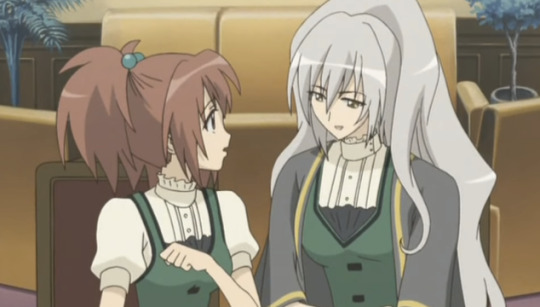
An adaptation of the light novels by Kimino Sakurako, apparently this is basically Maria-sama ga Miteru done in a moe style and with fanservice. I don’t have any more to say as I haven’t watched it and the summaries don’t clarify much beyond it being a slice-of-life character drama set at a girl’s school (possibly multiple girl’s schools).
20. Fragtime (60-minute OVA, 2019) - Anime News Network | MyAnimeList

Fragtime adapts the manga by Sato about Moritani Misuzu (Itou Miku), a girl who can stop time for three minutes every day, and Murakami Haruka (Miyamoto Yume), a classmate who isn’t affected by Misuzu’s power. Audiences seem split between those who appreciated it as a slightly supernatural-driven coming-of-age romance and those who found it superficial and male-gazey (there is a very juvenile obsession with underwear).
21. Sakura Trick (12 episodes, 2014) - Anime News Network | MyAnimeList

This adaptation of a yonkoma manga by Tachi follows best friends Takayama Haruka (Tomatsu Haruka) and Sonoda Yuu (Iguchi Yuka) who, worried about drifting apart due to a change in the classroom seating, fall into a kissing-focused friends-with-benefits arrangement. Some find it sweet, others find it male-gazey, it’s a tale as old as time when it comes to yuri.
Bonus: Yuri is My Job! (upcoming anime) - Anime News Network | MyAnimeList
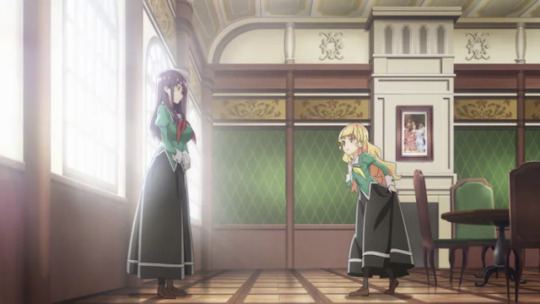
The recently-announced anime will adapt Miman’s ongoing manga about Shirasagi Hime (Ogura Yui), a high school student who gets pressured into working at a yuri-themed café where the waitstaff pretend to be students at a girl’s school who are in ambiguously gay relationships with each other. Hime is paired up with Ayanokouji Mitsuki (Uesaka Sumire), who plays the perfect onee-sama when working but hates Hime’s guts behind the scenes. Part human drama – like many a yuri series before it, the manga delves into the various characters inhabiting the café rather than just Hime and Mitsuki – and part metatextual riffing on the yuri genre, this should be one to look out for.
258 notes
·
View notes
Text
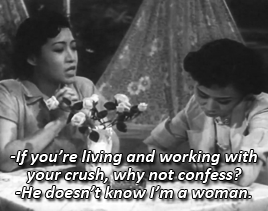




Five Days of Yam-Pak Movies ~ Day 3: Lovesick // 為情顛倒 (dir. Chiang Wai-Kwong/蔣偉光, 1952) - starring Yam Kim Fai (任劍輝) and Pak Suet Sin (白雪仙)
Commentary below the cut!
Summary The daughter of a shipping tycoon, Yam Ming Fai (Yam Kim Fai) runs the family business in Hong Kong while pretending to be a man, but dreams of being able to marry her male subordinate. Unfortunately for her, she finds out that he is already dating someone, a small-time singer named Chan Ping Sin (Pak Suet Sin). What else is a girl to do but try to seduce her crush’s girlfriend, to force them to break up? (Many things, surely, but the multitude of other options do not occur to Ming Fai.) But while Ming Fai wins the battle, she loses the war, because although Ping Sin falls for her, her crush gets engaged to another woman instead. There is also a subplot about a working-class couple who want to get married despite their parents’ disapproval, which feels almost like a whole separate movie folded into this one.
Despite the inevitably conservative ending, it’s a fun watch, made funnier by how the movie seems to wink at the audience with regard to the queer elements. At the start, the script has Ming Fai assert both her heterosexuality and gender-conformity to a female friend, but in the film itself Yam is bursting with a cheeky charm not found in her other characters, who are generally rather staid and earnest. There’s also a heavy emphasis on the flirting with Pak’s character, and there are multiple instances of Ming Fai boasting to her male crush about winning Ping Sin’s affections – supposedly to make him jealous, but she seems far too gleeful for this to be the case. Ping Sin herself is also an interesting case; there’s a large contrast between her harsh, dismissive treatment of her boyfriend and her sweet attitude towards Ming Fai throughout, which subtly undermines the ending wherein she returns to the former. And it would be remiss not to add that yes, the character names are definitely riffing on the actors’ names – “Yam Ming Fai” and a lot of the other characters’ names are obvious enough, but even the “Chan” in “Chan Ping Sin” comes from Pak Suet Sin’s real name, Chan Suk Leung/陳淑良. Make of that what you will.
Note: Sadly, this is the only extant film wherein Yam plays a female character who is romantically linked with Pak’s character in some way; copies no longer seem to exist for the five other examples, namely Lucky Strike/福至心靈 (1951), Stage-Fans’ Sweetheart/戲迷情人 (1952), Two Naughty Girls/一對胭脂馬 (1952), Love Affairs of the Opera Master/伶王艷史 (1953), The Clumsy Lover/糊塗脂粉客 (1953).
Links:
My post about Yam Kim Fai and Pak Suet Sin being queer icons
Full movie on Bilibili
6 notes
·
View notes
Text
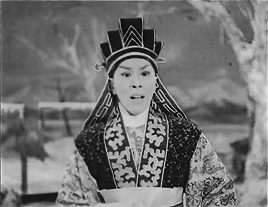
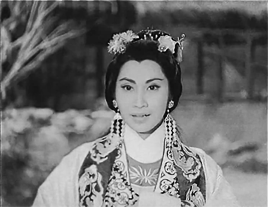
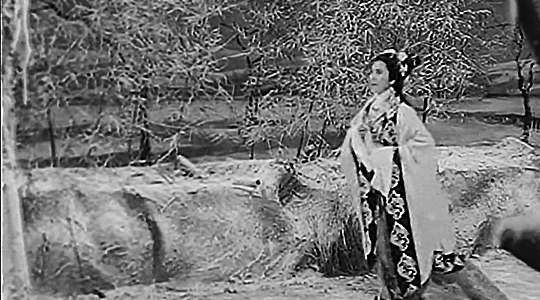
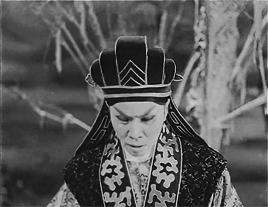
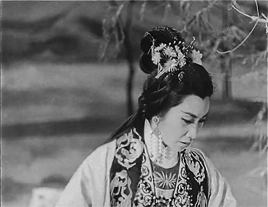
Five Days of Yam-Pak Movies ~ Day 4: Xi Shi, The Eternal Beauty // 西施 (dir. Chu Kea / 珠璣, 1960) - starring Yam Kim Fai (任劍輝) and Pak Suet Sin (白雪仙)
Scene outline and more information below!
Outline Based on the folk tales surrounding Xi Shi, one of the Four Great Beauties (四大美女) of China. The Yue Kingdom has been conquered by the warmongering Wu Kingdom, and its king and queen have been taken hostage. In a bid to rescue the monarch and turn the tables, minister Fan Li (Yam Kim Fai) recruits the humble but politically-minded washerwoman Xi Shi (Pak Suet Sin) and trains her up to become the king of Wu’s concubine— in other words, their woman on the inside. Both fall for each other, but love their country too much to call off the mission, so Xi Shi enters the Wu Kingdom’s court as originally planned. And it turns out that she is naturally gifted as a saboteur: drawn in by her beauty and constantly turned around by her cleverness, the king of Wu soon becomes a puppet dancing to the tune of Yue’s liberation… Scene Summary Although Xi Shi is an excellent spy, that’s not to say that she does not face her own share of troubles. She is isolated, having no compatriots apart from another concubine sent with her from Yue Kingdom, and not knowing when she can see her love next; and of course, there is also a very high chance of her dying in the Wu Kingdom even if she succeeds in causing its ruin. In this scene, Xi Shi has spent some time at the Wu court and so is elated to see a visiting Fan Li – however, both are filled with mixed emotions, knowing that their reunion is only temporary and that they cannot allow their feelings to jeopardise the mission.
What’s great about Xi Shi, The Eternal Beauty is that it’s basically a spy movie in a period setting. Sure, Xi Shi is beautiful, but the emphasis is on her being hyper-competent and highly intelligent; even when the king of Wu and his advisors are suspicious of her, she’s able to run circles around them. And despite it being a honey trap, there’s no threat of sexual assault or sexual violence at all! Thanks to the censorship of the 1950’s, the king of Wu is reinterpreted as just someone who really likes watching (non-sexualised) dance performances. It’s a novel take on Xi Shi, as most tellings depict her as being a passive pawn, whether as a helpless woman whose body is exploited in the conflict between Yue and Wu, or as someone who manages to ruin a kingdom purely by dint of being so beautiful that the ruler cannot focus on his duties. Take a look the essay linked below, and marvel at how much better this movie is!
Links:
My post about Yam Kim Fai and Pak Suet Sin being queer icons
An English-language academic essay by HKU professor Olivia Milburn on the depictions on Xi Shi in early Chinese literature
Full movie on Youtube
5 notes
·
View notes
Text
Queer Women in Qing China: Chen Yun & Han Yuan in Six Records of a Floating Life

(Pak Suet Sin as Chen Yun (left) and Yam Kim Fai as Shen Fu (right) in Madam Yun, dir. Chu Kea, 1960)
Despite being written by a relatively unremarkable man, Shen Fu's (沈復) Qing-era autobiography Six Records of a Floating Life (浮生六記) captured the public imagination for its depiction of an unusually loving married couple - namely the author and his wife Yun - and for being very sad, because the wife died young after a protracted battle with illness and poverty. Their tragic tale has inspired films, TV series, stage plays, Chinese operas, and musicals.
But for some reason (spoiler alert: it's homophobia), as far as I can tell (see note 2 below the cut), the derivative media all fail to mention that while Yun certainly loved Shen Fu, there was also someone else she loved-- a female courtesan named Han Yuan, whom she convinced her husband to take on as concubine. Although there are only a few references to Han Yuan throughout the book, her impact is outsize, making her absence from the various adaptations all the more glaring.
So let's try to rectify things, shall we? Extracted here are all the references to the relationship between Yun and Han Yuan contained in Six Records of a Floating Life - although I haven't included all the other nods to Yun's fruitiness, so do check out the book in full - click below!
Overview
The happily married Chen Yun falls for the female courtesan Han Yuan and the two soon become sworn sisters (see note 1 below). Then, to ensure they can remain together, she manages to persuade her husband to take the latter as his concubine despite his protestations that they cannot afford another mouth to feed. This turns out to have unfortunate consequences: Yun's in-laws, who she was already on thin ice with, are highly critical of the two women's relationship, and have the married couple expelled from the familial home. Further, while Yun and her husband are living elsewhere, a wealthy man pressures Han Yuan into leaving and becoming his wife instead. Yun falls into despair and the heartbreak causes her already-delicate condition to deteriorate, leading to her eventual demise.
Note 1: Sworn kinship is the most widely-available Chinese custom allowing for the formalisation of a relationship between individuals of the same gender, other than those specifically hierarchical in nature (e.g. adoption, godparents, mentorship, etc.). While not primarily romantic in association, there is certainly precedent for it: arguably the most famous Chinese love story, The Butterfly Lovers, focuses on the romance between a man and a cross-dressing woman who swore an oath of brotherhood. Even after the latter reveals that she is female, there are repeated references to their oath, and the man continues to refer to her using familial terms (賢弟/"worthy younger brother" is simply switched to 賢妹/"worthy younger sister"). Note 2: As far as I can tell, Han Yuan really does never come up in the various derivative works. However, there is some (mostly very mild) hinting regarding the in-laws' disapproval stemming in part from Yun's failure to conform to cishet norms; at least three of the adaptations from Hong Kong take as the flashpoint an incident where Yun dresses as a man in order to enjoy the Mid-Autumn festivities with her husband (see the GIF in the header) and is discovered, despite it not having had any negative consequences in the book. (There is such a cross-dressing scene in the 2021 Kunqu opera adaptation, but for some reason, in that version, Yun seems to have been on great terms with her in-laws and there was no disownment at all.) AFAIK the only adaptation that explicitly deals with Yun's queerness is the 1987 dance production from Hong Kong, wherein the disownment happens after a scene which I'll just describe as "the Mid-Autumn Festival incident, but as a boat ride which Yun turns into a threesome between herself, the boat-girl, and her husband". This actually pulls from the source material, as there is a somewhat suggestive episode involving a boatsman's daughter (this is a few pages before Han Yuan is introduced - I did say Yun was fruity)... but it's interesting that the creators decided to depict her queerness through a drunken one-night stand where she's dressed in male clothing (which was not the case in the original, though the boat-girl does still know she's a woman in this version), instead of committing to her much deeper relationship with Han Yuan.
A (probably-incomplete) list of adaptations
Fei Mu/费穆’s 1943 stage play Six Records of a Floating Life/浮生六记 (PRC)
1947 film Six Records of a Floating Life/浮生六记 (PRC) – dir. Pei Chong/裴冲, starring Su Shi/舒适 and Sha Li/沙莉
1954 film Madam Yun/芸娘 (Hong Kong) – dir. Ng Wui/吳回, starring Cheung Wood-Yau/張活游 and Pak Yin/白燕 – full movie
1960 Cantonese opera film Madam Yun/芸娘 (Hong Kong) – dir. Chu Kea/珠璣, starring Yam Kim Fai/任劍輝 and Pak Suet Sin/白雪仙 – full movie; also see my posts on it here and here
1987 dance performance Six Records of a Floating Life/浮生六記 (Hong Kong) – dir. Chan Kai-Tak – full performance
Cantonese opera Shen San Bai and Madam Yun/沈三白與芸娘 (Hong Kong) – multiple productions from different theatre companies across the years – clip
1974 TV drama Madam Yun/芸娘 (Hong Kong)
Zhou Mian/周眠's 2018 Kunqu opera Six Records of a Floating Life/浮生六记 (PRC) – multiple productions – clip 1 | clip 2
Luo Zhou/罗周's 2021 Kunqu opera Six Records of a Floating Life/浮生六记 (PRC) – multiple productions – full performance (w/ English subtitles)
Tian Chenming/田辰明’s 2021 musical Six Records of a Floating Life/浮生六记 (PRC) – multiple productions – clip
2023 Peking opera Six Records of a Floating Life/浮生六记 (PRC) – assorted clips
Extracts from Six Records of a Floating Life, trans. Leonard Pratt and Chiang Su-Hui, 1983, Penguin Books
Part I – The Joys of the Wedding Chamber
(p.48)
In the seventh month of the Chiayen year of the reign of the Emperior Chien Lung I returned from Yuehtung with my friend Hsu Hsiu-feng, who was my cousin’s husband. He brought a new concubine back with him, raving about her beauty to everyone, and one day he invited Yun to go and see her. Afterwards Yun said to Hsiu-feng, “She certainly is beautiful, but she is not the least bit charming.”
“If your husband were to take a concubine,” Hsiu-feng asked, “would she have to be charming as well as beautiful?”
“Naturally,” said Yun.
“From then on, Yun was obsessed with the idea of finding me a concubine, even though we had nowhere near enough money for such an ambition.
(p.49)
[The courtesan Leng-hsiang] had a daughter named Han-yuan, who, though not yet fully mature, was as beautiful as a piece of jade. Her eyes were as lovely as the surface of an autumn pond, and while they entertained us it became obvious that her literary knowledge was extensive. She had a younger sister named Wen-yuan who was still quite small.
At first I had no wild ideas and wanted only to have a cup of wine and chat with them. I well knew that a poor scholar like myself could not afford this sort of thing, and once inside I began to feel quite nervous. While I did not show my unease in my conversation, I did quietly say to Hsien-han “I’m only a poor fellow. How can you invite these girls to entertain me?”
Hsien-han laughed. “It’s not that way at all. A friend of mine had invited me to come and be entertained by Han-yuan today, but then he was called away by an important visitor. He asked me to be the host and invite someone else. Don’t worry about it.”
At that, I began to relax. Later, when our boat reached Pantang, I told Han-yuan to go aboard my mother’s boat and pay her respects. That was when Yun met Han-yuan and, as happy as old friends at a reunion, they soon set off hand in hand to climb the hill in search of all the scenic spots it offered. Yun especially liked the height and vista of Thousand Clouds, and they sat there enjoying the view for some time. When we returned to Yehfangpin, we moored the boats side by side and drank long and happily.
(p.50)
As the boats were being unmoored, Yun asked me if Han-yuan could return aboard hers, while I went back with Hsien-yan. To this, I agreed. When we returned to the Tuting Bridge we went back aboard our own boats and took leave of one another. By the time we arrived home it was already the third night watch.
“Today I have met someone who is both beautiful and charming,” said Yun. “I have just invited Han-yuan to come and see me tomorrow, so I can try to arrange things for you.”
“But we’re not a rich family,” I said, worried. “We cannot afford to keep someone like that. How could people as poor as ourselves dare think of such a thing? And we are so happily married, why should we look for someone else?”
“But I love her too,” Yun said, laughing. “You just let me take care of everything.”
The next day at noon, Han-yuan actually came. Yun entertained her warmly, and during the meal we played a game – the winner would read a poem, while the loser had to drink a cup of wine. By the end of the meal still not a word had been said about our obtaining Han-yuan.
As soon as she left, Yun said to me, “I have just made a secret agreement with her. She will come here on the 18th, and we will pledge ourselves as sisters. You will have to prepare animals for the sacrifice.”
Then, laughing and pointing to the jade bracelet on her arm, she said, “If you see this bracelet on Han-yuan’s arm then, it will mean she has agreed to our proposal. I have just told her my idea, but I am still not very sure what she thinks about it all.”
I only listened to what she said, making no reply.
It rained very hard on the 18th, but Han-yuan came all the same. She and Yun went into another room and were alone there for some time. They were holding hands when they emerged, and Han-yuan looked at me shyly. She was wearing the jade bracelet!
We had intended, after the incense was burned and they had become sisters, that we should carry on drinking. As it turned out, however, Han-yuan had promised to go on a trip to Stone Lake, so she left as soon as the ceremony was over.
“She has agreed,” Yun told me happily. “Now, how will you reward your go-between?” I asked her the details of the arrangement.
(p.51)
“Just now I spoke to her privately because I was afraid she might have another attachment. When she said she did not, I asked her, “Do you know why we have invited you here today, little sister?”
““The respect of an honourable lady like yourself makes me feel like a small weed leaning up a great tree,” she replied, “but my mother has high hopes for me, and I’m afraid I cannot agree without consulting her. I do hope, though, that you and I can think of a way to work things out.””
“When I took off the bracelet and put it on her arm I said to her, “The jade of this bracelet is hard and represents the constancy of our pledge; and like our pledge, the circle of the bracelet has not end. Wear it as the first token of our understanding.” To which she replied, “The power to unite us rests entirely with you.” So it seems as if we have already won over Han-yuan. The difficult part will be convincing her mother, but I will think of a plan for that.”
I laughed, and asked her, “Are you trying to imitate Li-weng’s Pitying the Fragrant Companion?”
“Yes,” she replied.
(Footnote 44 of Part 1, p.153) The Lien Hsiang Pan, a play by Li Yu (1611-?1680). Li-weng was his literary name. Yun’s confirmation that she had this play in mind gives us our principal clue about just what her real relationship with Han-yuan may have been: the play tells the story of a young married woman who falls in love with a girl, and then obtains her as a concubine for her husband so the two women can be together. As van Gulik has pointed out, Imperial China regarded liaisons between women – as opposed to those between men – quite tolerantly. They did not by any means necessarily imply a lack of affection between such women and their husbands (R.H. van Gulik, Sexual Life in Ancient China, Humanities Press, 1974: he discusses female homosexuality on p.163, and the play itself on p.302, where he translates its title as Loving the Fragrant Companion.)
From that time on there was not a day that Yun did not talk about Han-yuan. But later Han-yuan was taken off by a powerful man, and all the plans came to nothing. In fact, it was because of this that Yun died.
Part III – The Sorrows of Misfortune
(p.76)
Yun had had the blood sickness ever since her younger brother Ko-chang had run away from home and her mother had missed him so much that she died of grief. Yun was so distraught she had fallen ill herself. From the time she met Han-yuan, she passed no blood for over a year, and I was delighted that Yun had found such a good cure in her friend, when Han-yuan was snatched away by an influential man who paid a thousand golds for her and also promised to take care of her mother. “The beauty belongs to Sha-shih-li!” I had learned of all this but had not dared to say anything to Yun, so she did not find out about it until one day when she went to see Han-yuan. She returned weeping, and said, “I had not thought Han’s feelings could be so shallow!”
“Your own feelings are too deep,” I said. “How can that sort of person be said to have feelings? Someone who is used to beautiful clothes and delicate foods could never grow accustomed to thorn hairpins and plain cloth dresses. It’s better that we should be unsuccessful now than to have her regret things later.”
I comforted her repeatedly, but having been so wounded Yun still suffered great discharges of blood. She was bedridden and did not respond to any treatment. She suffered relapses, and became so thin you could see her bones. After a few years the money we owed increased daily, and so did the gossip about us. And because she had pledged sisterhood with a sing-song girl, my parents’ scorn for Yun deepened daily.
(p.78)
[…] a messenger arrived. He had been sent by a woman who had been a sworn sister of Yun’s as a child, who had married a man named Hua from Hsishan, and who had heard of her illness and wanted to inquire after her.
My father, however, mistakenly thought he was a messenger from Han-yuan and so became even angrier, saying, “Your wife does not behave as a woman should, swearing sisterhood with a sing-song girl. Nor do you think to learn from your elders, running around with riff-raff. […]”
(p.79-80)
These were Yun’s parting instructions to our daughter: “Your mother has had a bitter fate and emotions that run too deep; therefore we have had many problems. Fortunately your father has been kind to me, and there is nothing to worry about in our leaving. […]”
(p.86)
I returned to find Yun moaning and weeping, looking as if something awful had happened. As soon as she saw me she burst out, “Did you know that yesterday noon [our servant] Ah Shuang stole all our things and ran away? I have asked people to search everywhere, but they still have not found him. […]”
(p.87)
[…] from then on she began frequently to talk in her sleep, calling out, “Ah Shuang has run away!” or “How could Han-yuan turn her back on me?” Her illness worsened daily.
Finally I was about to call a doctor to treat her, but she stopped me. “My illness began because of my terribly deep grief over my brother’s running away and my mother’s death,” said Yun. “It continued because of my affections, and now it has returned because of my indignation. I have always worried too much about things, and while I have tried my best to be a good daughter-in-law, I have failed.
These are the reasons why I have come down with dizziness and palpitations of the heart. The disease has already entered my vitals, and there is nothing a doctor can do about it. Please do not spend money on something that cannot help. […]”
[…]
(p.88)
Suddenly she fell silent and began to pant, her eyes staring into the distance. I called her name a thousand times, but she could not speak. Two streams of agonised tears flowed from her eyes in torrents, until finally her panting grew shallow and her tears dried up. Her spirit vanished in the mist and she began her long journey.
[…] Alas! Yun came to this world a woman, but she had the feelings and abilities of a man. After she entered the gate of my home in marriage, I had to rush about daily to earn our clothing and food, there was never enough, but she never once complained. When I was living at home, all we had for entertainment was talk about literature. What a pity that she should have died in poverty and after long illness. And whose fault was it that she did? It was my fault, what else can I say? I would advise all the husbands and wives in the world not to hate one another, certainly, but also not to love too deeply. As it is said, “An affectionate couple cannot grow old together”. My example should serve as a warning to others.
19 notes
·
View notes
Text
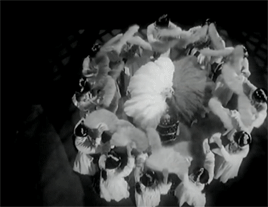
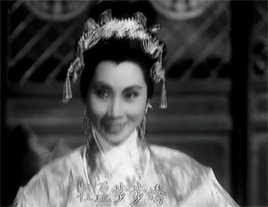

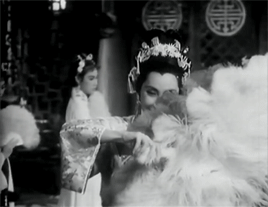
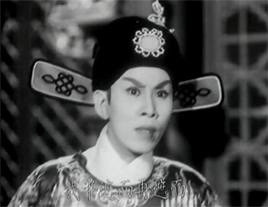
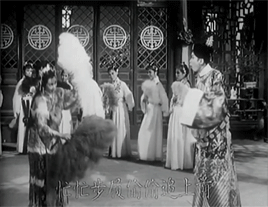
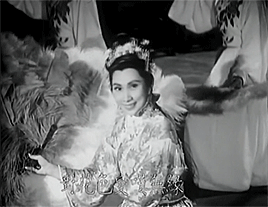
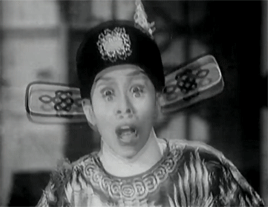
Five Days of Yam-Pak Movies ~ Day 5: Butterfly and Red Pear Blossom // 蝶影紅梨記 (dir. Lee Tit / 李鐵, 1959) ~ Final Scene: 紅梨復艷 - starring Pak Suet Sin (白雪仙) and Yam Kim Fai (任劍輝)
Scene outline and more information below!
Final Scene: The Red Pear Tree Blossoms Again // 紅梨復艷 After many trials and tribuations, courtesan So-chau (Pak Suet Sin) is finally able to reunuite with her lover Chiu Yu-chau (Yam Kim Fai). However, Chiu – a newly-appointed magistrate tasked with eliminating corruption – is determined not to enjoy the festivities, especially as he believes So-chau to be dead. Eventually, So-chau succeeds in drawing his attention, but Chiu is shocked to see her standing before him, and immediately assumes that she is a ghost (there are story reasons for this, but it’s still funny to see). Thankfully, the misunderstandings are quickly cleared up and the pair have their happily ever-after-after. Note: The English title is a very loose interpretation of the original title of the scene, which would be more literally translated as “The Red Pear Blossom Returns to its Full Glory”. Also, the scene summary is not entirely accurate because it would take far too long to go into the exact details… this film has quite a few twists and turns XP
Links:
My post about Yam Kim Fai and Pak Suet Sin being queer icons
My summary of the film
Clip of this scene on Youtube
Full film on Youtube
7 notes
·
View notes
Text



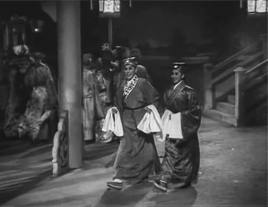

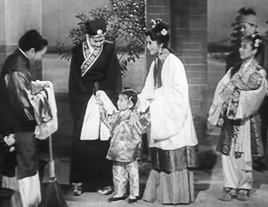
Five Days of Yam-Pak Movies ~ Day 1: Madam Yun // 芸娘 (dir. Chu Kea / 珠璣, 1960) - starring Yam Kim Fai (任劍輝) and Pak Suet Sin (白雪仙)
Summary and more information under the cut!
Summary Inspired by Shen Fu/沈復's Qing Dynasty autobiography Six Records of a Floating Life/浮生六記. Madam Yun focuses on Shen Fu (Yam Kim Fai) and his wife Yun (Pak Suet Sin), who live in married bliss with their children at the former’s familial home. However, they fall foul of the machinations of Shen Fu’s younger half-brother, who has designs on the inheritance, and are summarily kicked out. The young family struggle to adjust to their poverty, but their plight is worsened by Yun becoming chronically ill; these desperate straits result in Shen Fu having to leave his family behind in search of paying work. Thankfully, after all his efforts he is able to find a benefactor, and the family is reunited under one roof (which is, sadly, not what happened in real life).
Links:
My post about Yam Kim Fai and Pak Suet Sin being queer icons
Full movie on YouTube
13 notes
·
View notes
Text



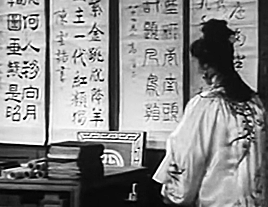

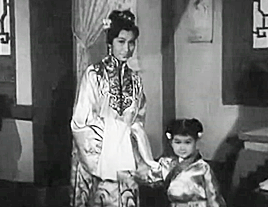
Five Days of Yam-Pak Movies ~ Bonus: Madam Yun // 芸娘 (dir. Chu Kea/珠璣, 1960) - starring Yam Kim Fai (任劍輝) and Pak Suet Sin (白雪仙)
Click below for more information + some commentary!
Outline & Scene Summary Inspired by Shen Fu/沈復's Qing Dynasty autobiography Six Records of a Floating Life/浮生六記. Madam Yun focuses on Shen Fu (Yam Kim Fai) and his wife Yun (Pak Suet Sin), who live in married bliss with their children at the former’s familial home. However, they fall foul of the machinations of Shen Fu’s younger half-brother, who has designs on the inheritance, and are summarily kicked out. The young family struggle to adjust to their poverty, but their plight is worsened by Yun becoming chronically ill; these desperate straits result in Shen Fu having to leave his family behind in search of paying work. Thankfully, after all his efforts he is able to find a benefactor, and the family is reunited under one roof (which is, sadly, not what happened in real life). In this early scene depicting the calm before storm, Shen Fu is trying to write a poem, but struggles to find the right words to finish off a line. As he is musing, his wife sneaks up and writes in her own suggestion, delighting him with her scholarly wit.
Although the movie as a whole is pretty dour, the first few scenes really stood out to me as a lovely (if inadvertent) depiction of an F/F couple being happily married with children, especially as Pak’s character is not reduced to being a mere mother or housewife, and the focus remains on the love between the pair. It’s also notable that the source material is known for being a rare depiction of a loving marriage in Chinese literature, and the earlier 1954 film adaptation specifically cast two actors who frequently played married couples (namely Cheung Wood-Yau/張活游 and Pak Yin/白燕; see source). The casting of Yam-Pak for this movie indicates that the studio was confident the public would embrace them as not only a romantic pairing, but specifically the ideal of a married couple.
Note: Six Records of a Floating Life is very much worth reading, not only because it's a vividly-drawn portrait of everyday life in 19th-century China (floral arrangements! exam LARPing! complaining about how touristy Hangzhou's West Lake is!), but also because it contains queer elements. There are references to Yun having a relationship with another woman (and asking her husband to take her on as a concubine, lol) and being attracted to other women, none of which are mentioned in this movie.
Links:
My post about Yam Kim Fai and Pak Suet Sin being queer icons
Full movie on Youtube
11 notes
·
View notes
Text
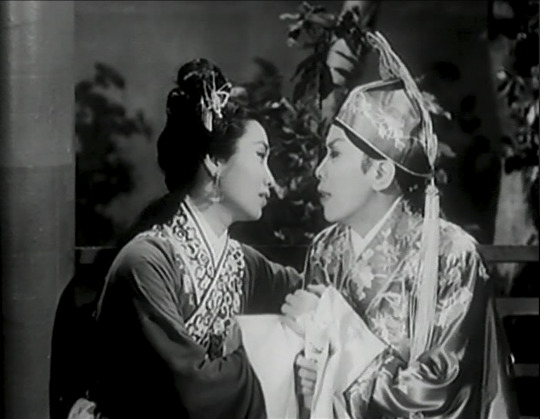
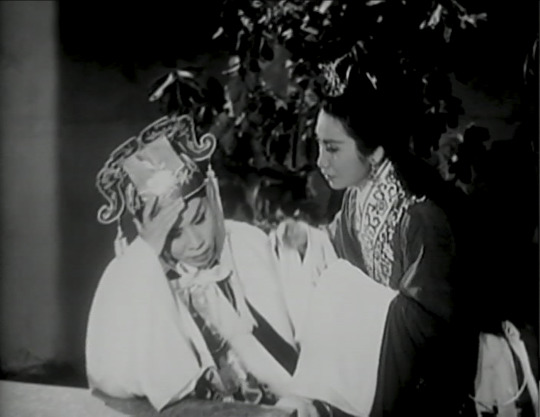

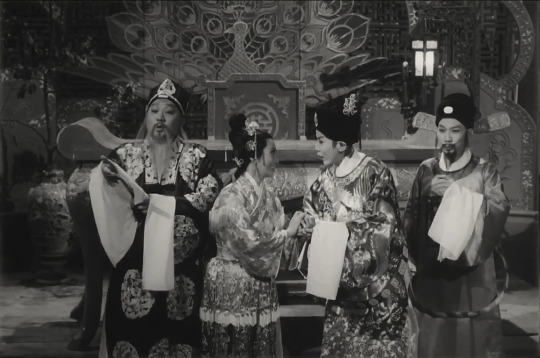
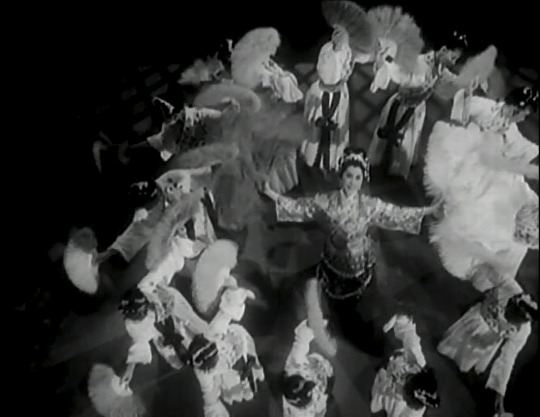
Screening Announcement! (Dec 10th & 17th, 2023)
Update as of 6 Dec 2023: There are still decent seats left for the 6pm & 9pm showings on Dec 10th, and for all four screenings on Dec 17th!
If anyone here will be in Hong Kong this December 10th or 17th (both Sundays), and has even a passing interest in Yam Kim Fai and Pak Suet Sin (see my post on them here), queerness in East Asia and/or the 1950’s, or Chinese opera, I strongly urge you to go to one of the eight screenings of the restored version of Butterfly and Red Pear Blossom (蝶影紅梨記)!
Not only is it a great romantic comedy (yes, really), it’s also a very rare opportunity to see a classic Cantonese opera movie – or indeed any black and white Hong Kong movie – with English subtitles and in 4K resolution. For a taster, check out this excellent dance scene (not 4K) and this video from the Hong Kong Film Archive about their restoration efforts!
On top of that, it’ll be showing in the cinema of the storied Sunbeam Theatre (新光戲院), which opened in 1972 and is Hong Kong’s last commercial Cantonese opera theatre. (It must be added that being able to go there will soon become an even rarer opportunity; the venue will sadly be closing in 2025 as heritage is apparently a joke in Hong Kong.)
Here's a quick outline of the story for those who need a bit more convincing:
Penned by the Shakespeare of Cantonese opera, Tong Tik Sang (唐滌生), this retelling of Yuan-dynasty opera Tale of Red Pear Flower (謝金蓮詩酒紅梨花) starts off fairly sober - courtesan So-chau (Pak Suet Sin) and scholar Chiu Yu-chau (Yam Kim Fai) are long-distance lovers, but before they are able to meet in person for the first time, So-chau is forced to fake her death to avoid being sent off to a barbarian warlord. But then it morphs into an unexpected romantic comedy: in her escape, So-chau ends up at a relative’s house… only to find that Chiu will be moving in as a guest there that very night. Unfortunately for her, she’s been forbidden by her uncle from disclosing her identity for fear of disrupting Chiu’s studies, and Chiu is extraordinarily – albeit adorably – dumb. Apart from the two leads being played by women, it’s really easy to read queer themes into how So-chau is desperate with longing and yet unable to directly articulate her desires and identity, permitted only to hint and nudge. (As is the movie as a whole in some ways, since Hong Kong movies of that era were very prudish; even heterosexual kisses weren’t allowed onscreen.) Chiu, kind-hearted but oblivious, echoes the familiar figure of the queer crush. Also, Pak plays So-chau with the thirstiness of a marathon runner who hasn’t had a drop of water since the start of the race, so there’s that to enjoy too :)
Tickets are available on the Cityline website for HK$70 each (linked here – change the language to English by clicking “Eng” in the menu); note that you’ll need to make an account to make a purchase. Dec 10th and Dec 17th will both have four screenings each (12pm, 3pm, 6pm, and 9pm), but seating is very limited so you should definitely buy your ticket sooner rather than later!
29 notes
·
View notes